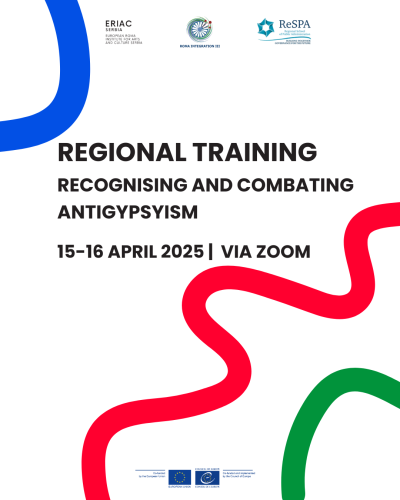Call for Participants: Regional Training on Recognising and Combating Antigypsyism in Public Administration
Call for Participants – Regional Training on Recognising and Combating Antigypsyism
15–16 April 2025 | Online
The European Roma Institute for Arts and Culture Serbia (ERIAC Serbia), in cooperation with the Regional School of Public Administration (ReSPA), is pleased to announce the Regional Training on Recognising and Combating Antigypsyism, which will take place online, on 15-16 April 2025 via Zoom. The training is part of the project “Addressing Antigypsyism and Mainstreaming Roma Issues in the Western Balkans and Türkiye,” implemented by ERIAC Serbia with the financial support of the Roma Integration Phase III Joint Programme of the European Union and the Council of Europe.
Organised as part of the Opre Roma Month, this two-day online training aims to enhance participants’ understanding of antigypsyism and its systemic impact on governance and public administration. Designed for public servants from the Western Balkans Six (WB6) and Türkiye, the program will provide practical tools to address antigypsyism at the institutional and policy levels. The sessions will feature experts from the region and the EU, as well as case studies on best practices. Participants will receive digital certificates of attendance, co-signed by the Council of Europe (CoE), the Regional School of Public Administration (ReSPA), and the European Roma Institute for Arts and Culture (ERIAC).
Please download the training agenda here: Training Agenda (pdf)
Kindly note that we will provide simultaneous translation to/from Albanian, Serbian, Turkish and English.
To confirm your participation, please register via the following LINK no later than 11 April 2025 CoB.The Zoom link will be provided upon registration.
For any further inquiries, please contact nadja.greku@eriac.org.
We look forward to your participation.
Disclaimer: This activity is implemented with the financial support of the Roma Integration III Joint Programme of the European Union and the Council of Europe. The views expressed herein can in no way be taken to reflect the official opinion of the European Union or the Council of Europe.
